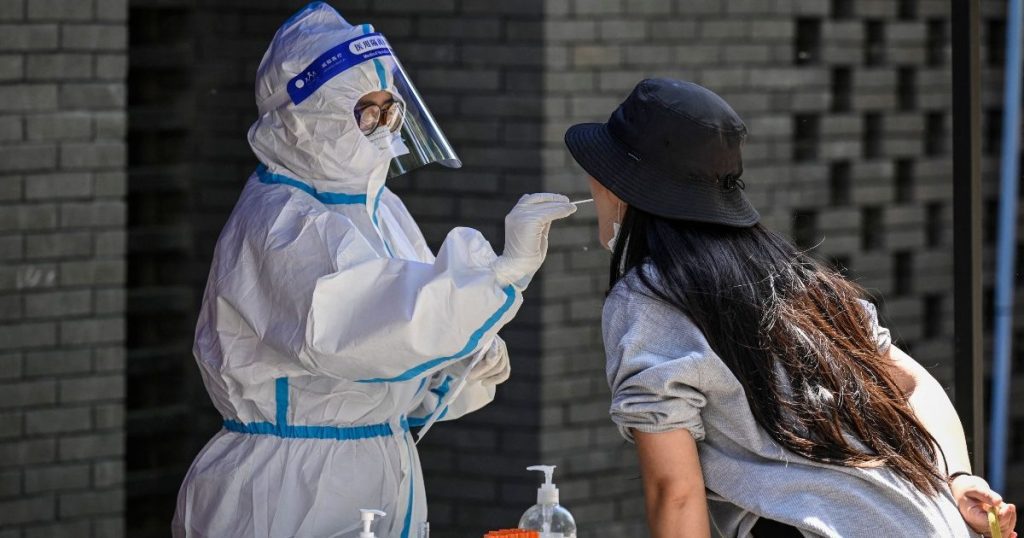(CNN Spanish) — Now that many people are re-acquiring Covid-19, you may be wondering what steps to take to avoid contracting it or what protocol to follow if you test positive.
If you’re vaccinated and have a booster, are you safe? If you have recently been infected with Covid-19, how likely are you to become infected again? Do you have to cancel your trips or put a social life on hold again because of the increasing number of cases? If you test positive for coronavirus, should you continue to self-isolate? how long
These are some of the frequently asked questions that will arise this summer amid an increase in cases around the world. Omicron’s subvariant BA.5 It became capable of evading immunity caused by vaccines and natural diseases.
We help you answer all these concerns, at least for a little while as Covid-19 is here to stay and is now a part of our daily lives.
First, you have to be careful.
It is true that recent spikes in Covid-19 cases have not been accompanied by overcrowding in hospitals, which explains the powerful effect of vaccines in differentiating infections from serious diseases, given the fact that immunity wanes over time. Some evasion with new subtypes currently dominant (BA.4 and BA.5).
So, if you want to be cautious and reduce your risk of infection, take into account this series of recommendations based on the advice of Dr. Lena Wen, a CNN medical analyst, emergency room physician, and professor of health policy and administration at the School of Medicine. in Public Health from the George Washington University Milken Institute.
- Even if you’ve already had Covid-19, stay up-to-date on vaccinations.
Dr. Wen explains that the BA.5 subtype “may be somewhat immune-evasive.” However, vaccination protects you from serious diseases.
Additionally, he assures that re-infection with Covid-19 is “definitely possible”, especially after three months.
“People with pre-omicron variants, such as delta or alpha, are prone to re-infection with omicron subtypes. We’re seeing re-infection in people with the original omicron variant who are now receiving PA.5.” Ven.
- Use masks in closed public places
“Just because mask mandates are lifted doesn’t mean people shouldn’t wear them,” Wen says, adding that she encourages people who feel uncomfortable wearing them in high-risk environments like airport security lines to wear them.
If you are an immunocompromised person, it is best to use a high-quality N95 or equivalent mask that fits well and is worn at all times.
- Attend or hold your meetings outdoors, which are less risky than indoors.
“Coronavirus is airborne, and the more air circulation the better,” says Dr Wen, reminding him of the importance of ventilation. “(A place) is less dangerous than a small, closed room with open windows and doors.”
If you’re an immunocompromised person, consider eating before attending a meeting, so don’t remove your mask and only when you’re outside, Wen suggests. In conclusion, “It all depends on how much you want to avoid Covid-19 and the benefits they get from attending.”
Should you self-quarantine if you become infected?
The Guide The Centers for Disease Control and Prevention (CDC) in the United States says that if you’ve been exposed to Covid-19, you should get tested after five days, even if you don’t have symptoms.
If you test positive, you must self-isolate for at least five days.
After this time and if symptoms improve, you should wear a mask when in contact with others or in public places for at least 10 days or until the test is negative.
You should not travel until your test result is negative.
Avoid being around people who may be seriously ill with Covid-19.
But for clear guidance on what to do, the CDC has provided a tool to help you determine how long you should self-quarantine, depending on whether you have mild symptoms or no symptoms.
to enter Here is the CDC calculator. Once entered, you must answer the options that best suit your case. Among other things, they will ask you whether you have been in contact with someone positive for Covid-19 or tested positive yourself, whether you are up-to-date on your vaccinations, symptoms and dates.
Dr. Wen said a “one test policy” is the best option because people can be infected at different times.
“I would encourage people to do daily home testing from day four and end isolation if the home rapid antigen test is negative.”
Need to cancel your trips?
After a year-and-a-half of strict lockdowns and tighter restrictions that paralyzed the world’s airspace, people are back to traveling for pleasure or to attend work meetings or conferences, but what can they do to avoid catching Covid-19? On the way?
Dr. Wen says travelers have two options: minimize the risk of travel and assume that you may be exposed to Covid-19 during your trip.
To reduce the risk, you should take the same precautions mentioned above, such as wearing a mask indoors and avoiding taking it off when surrounded by people in poorly ventilated events.
With information from CNN’s Katia Hetter

“Music ninja. Analyst. Typical coffee lover. Travel evangelist. Proud explorer.”


:quality(85)/cloudfront-us-east-1.images.arcpublishing.com/infobae/76Q3V4IS6W7CAP5TT6MVJGCHMQ.jpg)


:format(jpeg):focal(2425x455:2435x445)/cloudfront-us-east-1.images.arcpublishing.com/gfrmedia/VHMDSLP56BEZDI2PZFVOPDHJGA.JPG)

More Stories
China: Beijing warns US not to cross its “red lines”.
Half of Americans Support Mass Deportation of Immigrants | AlMomento.net
Real ID: New Jersey will make a definitive conversion of a driver's license to this other document | RPPUSA